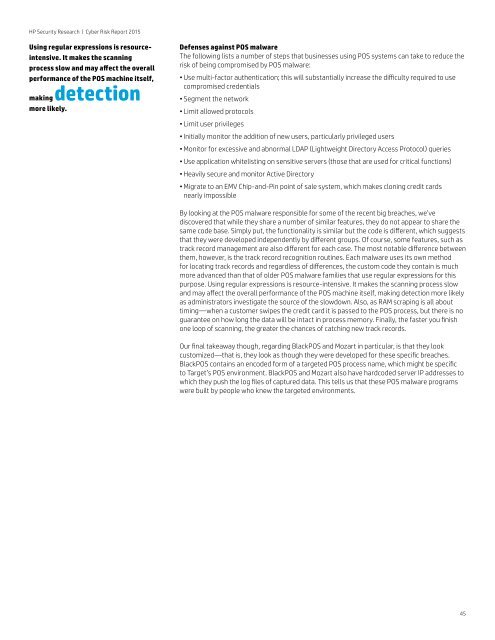hp-security-research-cyber-risk-report-pdf-2-w-1408
hp-security-research-cyber-risk-report-pdf-2-w-1408
hp-security-research-cyber-risk-report-pdf-2-w-1408
Create successful ePaper yourself
Turn your PDF publications into a flip-book with our unique Google optimized e-Paper software.
HP Security Research | Cyber Risk Report 2015Using regular expressions is resourceintensive.It makes the scanningprocess slow and may affect the overallperformance of the POS machine itself,making detectionmore likely.Defenses against POS malwareThe following lists a number of steps that businesses using POS systems can take to reduce the<strong>risk</strong> of being compromised by POS malware:• Use multi-factor authentication; this will substantially increase the difficulty required to usecompromised credentials• Segment the network• Limit allowed protocols• Limit user privileges• Initially monitor the addition of new users, particularly privileged users• Monitor for excessive and abnormal LDAP (Lightweight Directory Access Protocol) queries• Use application whitelisting on sensitive servers (those that are used for critical functions)• Heavily secure and monitor Active Directory• Migrate to an EMV Chip-and-Pin point of sale system, which makes cloning credit cardsnearly impossibleBy looking at the POS malware responsible for some of the recent big breaches, we’vediscovered that while they share a number of similar features, they do not appear to share thesame code base. Simply put, the functionality is similar but the code is different, which suggeststhat they were developed independently by different groups. Of course, some features, such astrack record management are also different for each case. The most notable difference betweenthem, however, is the track record recognition routines. Each malware uses its own methodfor locating track records and regardless of differences, the custom code they contain is muchmore advanced than that of older POS malware families that use regular expressions for thispurpose. Using regular expressions is resource-intensive. It makes the scanning process slowand may affect the overall performance of the POS machine itself, making detection more likelyas administrators investigate the source of the slowdown. Also, as RAM scraping is all abouttiming—when a customer swipes the credit card it is passed to the POS process, but there is noguarantee on how long the data will be intact in process memory. Finally, the faster you finishone loop of scanning, the greater the chances of catching new track records.Our final takeaway though, regarding BlackPOS and Mozart in particular, is that they lookcustomized—that is, they look as though they were developed for these specific breaches.BlackPOS contains an encoded form of a targeted POS process name, which might be specificto Target’s POS environment. BlackPOS and Mozart also have hardcoded server IP addresses towhich they push the log files of captured data. This tells us that these POS malware programswere built by people who knew the targeted environments.45


